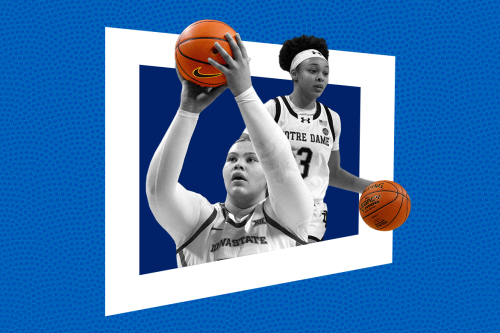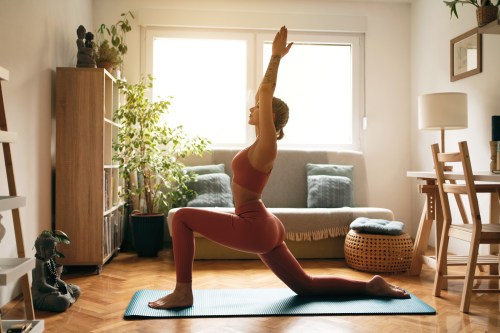Our editors independently select these products. Making a purchase through our links may earn Well+Good a commission
As someone who gets hyper-fixated on activities, I’ve cycled through my fair share of fitness fads. I ran cross-country, track, and road races, and I even completed (and wrote a book about) several marathons. I’ve tried dance-inspired cardio, swimming, HIIT workouts, and I did CrossFit for a year and lived to tell the tale.
Experts in This Article
a former collegiate tennis player and tennis teaching professional at Liberty Park Tennis Center in Salt Lake City, Utah
a USPTA-certified tennis professional who is currently an assistant coach for the University of Utah’s men’s tennis team
So when I picked up my old tennis racket five years ago, nobody, including me, thought it would become a huge and lasting part of my daily routine. But tennis is different. When I talk to other players, they all agree: Tennis isn’t just a sport; it’s a way of life. It’s more than a workout—it’s an activity that requires fitness, focus, strategy, and determination. Most importantly, it’s really freaking fun.
If you’ve ever been the slightest bit tennis-curious, it’s definitely worth picking up a racket. And I’m not just saying this because I want more hitting partners. The benefits of tennis include social, mental, and physical perks.
So, without further ado, here are seven benefits of tennis that’ll make you want to get out and hit.
1. It’s a full-body workout
Years ago, I remember reading (in one of those aughts-era glossy women’s mags) that tennis was the ultimate sport to “shape and tone your legs.” At this stage in my life, I couldn’t care less about shaping and toning, but I can attest to the massive burn you feel after mere minutes on the court. I’m sure the writers of that magazine meant to say that tennis is an incredible way to build glute, quad, hamstring, and calf strength.
“You have to run, and you have to push off with your legs. [Tennis] helps your balance because you have to cut and change direction all the time,” says Graeme Cox, a USPTA-certified tennis professional who is currently an assistant coach for the University of Utah’s men’s tennis team.
And it’s not just your legs that get stronger. When I first got back into tennis and was trying to design a strength program to complement my playing time, I got a book called Tennis Anatomy. When you go to the diagram showing which muscles are used, it shows nearly every part of your body.
“It’s a full-body workout,” Cox says. “It’s also a great workout for your core, because when you’re swinging the racket, most of the power, whether you’re aware of it or not, is coming from your core muscles. And then you’re swinging the racket with your arm.”
A 2019 study in Sports Health: A Multidisciplinary Approach1 compared musculoskeletal systems in recreational tennis players versus non-tennis players across a spectrum of ages. The tennis players showed much better upper-body muscle and joint functions and also had better lower-body function.
Beyond building muscular strength, tennis will also supercharge your cardiovascular system.
“If you played once or twice a week, you’d notice a significant improvement in short sprinting and stamina,” says Connor Frazier, a former collegiate tennis player and tennis teaching professional at Liberty Park Tennis Center in Salt Lake City, Utah. “The name of the game in tennis is not really how long you can go run for, but how fast you can recover for the next rally.”
These short bursts of effort followed by limited recovery are the secret sauce of boosting your anaerobic capacity and VO2 max2. And the best part? As you improve, it never gets easier. The rallies get longer, the ball comes faster, and your opponents get better. (Okay, maybe that’s not good news for everyone.)
Tennis isn’t just a sport; it’s a way of life. It’s more than a workout—it requires fitness, focus, strategy, and determination. Most importantly, it’s really freaking fun.
2. It’s fun even when you’re a beginner
Despite the physical demands of the sport, beginners can start having fun within minutes of walking on the court. Many people think you need to be supremely in shape to play tennis based on the matches you watch on TV, but in reality, it’s accessible to almost everyone, according to Frazier.
“I don’t think it requires as much fitness as people think, and I don’t think it requires much skill for it to be fun,” Frazier says. “I think there’s a minimum threshold for being able to rally, but I have some [older adults] and they have almost the most fun of out of anybody, and they’re dinking it back and forth.”
On day one, you might be able to knock the ball back and forth with a partner or against a wall six times in a row. If you stick with it, that number increases. Maintaining a rally becomes addictive. You’ll be at it for hours without even realizing it.
Part of the fun is the progress you make, Frazier explains.
“Nobody’s good at tennis at first, let’s be real,” he says. “But coordination is a learned skill. And it just takes a little bit of time—much less than you think—to get to a reasonable social level.”
3. It promotes a growth mindset
Here’s one of my favorite benefits of tennis: No matter what level you get to, you’re always learning something new. For many players who get hooked, that means hours spent problem-solving, researching, and working on new techniques.
The mental challenge of improving and meeting personal goals is significant. Cox has lessons with clients that range in age from 5 to 82 years old. He’s trained college athletes, a Navy SEAL aiming for an age group world championship, and a woman whose goal was to rally with her husband. Despite their varying aims, they all shared a common desire: to get better.
As you improve, your expectations evolve, leading to continuous mental engagement. This drive keeps you learning and prevents stagnation.
“There’s always room for improvement, which I think, mentally, is great because it keeps you sharp,” Cox says. “Tennis is so gray. It’s not black and white. You set up these relative expectations and have to deal with the relative success and failure with how you’re hitting the ball.”
Frazier agrees, and says that even when you don’t have anything to change with your strokes, there’s always something new to learn in terms of strategy or the game.
“For people who like to have an eternal project to work on, tennis is kind of perfect,” Frazier says.
4. It teaches resilience
Tennis is an emotionally taxing sport. As you start to compete, you’ll notice that every point, game, set, and match is an emotional rollercoaster. You’ll have days where your racket is on fire and you can’t miss a shot. You’ll also have bouts of losses, matches where you can’t even hit the ball over the net, a certain stroke that isn’t working—and you’ll have to overcome the emotional pitfalls and use logic to work your way through it.
“You’re competing mostly against yourself,” Frazier says. “And even though there’s someone else on the other side of the net you’re trying to beat, at the end of the day, you’ve got to play the best tennis for you. You learn that you can lose and still play really good and you can win and play really bad.”
One of the biggest benefits of tennis is learning how to accept your failures and self-soothe or amp yourself up before, during, and after matches. It’s an important lesson that goes beyond the confines of the court.
“One of the main things we see in all the juniors and kids is that a lot of confidence grows internally from getting through tough days,” Frazier says.
5. It helps you be mindful
We all know the importance of staying grounded and present—mindfulness is popular for a reason. For those of you who, like me, have a tough time with not thinking about 20 million things at once, tennis is an amazing brain break.
In tennis, you have to focus, no matter what level you’re playing at, on the fuzzy yellow ball. It’s that simple. The intense concentration is hard to achieve. But if you try, it can serve as an incredible moving meditation.
People who play more know that staying focused in match situations is super hard: You’re often distracted by the score, the anticipated outcome, or your emotions about how you’re playing.
“I deal with this at every level—from the high-performance players to the people who are just beginning. It’s very hard to stay in the moment and not either get way ahead of where you are mentally or get so down on yourself that you can’t play,” Cox says. “It boils down to focusing big time and what can you focus on? How can you compartmentalize?”
Even an attempt to train your brain to pay attention to the point at hand is an exercise in mindfulness. When you practice that time and time again, it gets easier. For me, it’s improved my concentration in other aspects of my life, too (for those rare occasions when I’m not thinking about tennis).
“It’s physically and mentally engaging, and it’s really cool to feel like you’re always improving at something.” —Graeme Cox, tennis coach
6. It’s the ultimate social sport
When I think about my social circle, most of my friends—including a few of my closest friends—are people I met through tennis.
“As an adult, it’s tough outside of work to make time to make friends,” Frazier says. “But having an excuse like tennis lends a hand to increasing social interactions. And since tennis is really a two-player or more game, it manufactures these environments. It seems like people from all different jobs and all different walks of life come together through tennis.”
And unlike fitness classes or group runs, there’s a built-in culture of connection in the tennis community. You chat during warmups, catch up on life between games as you switch sides, and before you know it, you’re invited to join lessons, teams, and leagues.
In almost every city, there are clinics for all levels and ages. These fun, group lessons are an awesome way to be welcomed into the tennis community. And it’s important to note that tennis is really no longer considered a country club sport: Your local YMCA or community center might offer workouts starting at $20 for 90 minutes.
“You meet new people and you rally and you play and it’s almost always a good time,” Frazier says.
7. It’s for life
You might’ve heard that tennis is a lifelong sport, and it’s true. You can start to learn as soon as you’re able to hold a racket, and you can play well into your golden years. It’s considered a sport for life because it’s non-contact and can be tailored to have lower impact on our joints and muscles as you age.
“You’ll see players who played at a very high level, who are now in their 70s or 80s, and obviously they’re not playing at the same level they used to play, but they still love playing and they’ve found people to play with,” Cox says.
It’s an excellent sport as you age because it combines physical fitness, mental acuity, and socialization. And, according to a 2017 article in the British Journal of Sports Medicine3, not only is it a lifetime sport, but it may actually help you live longer by about 10 years. More recent research4 showed older tennis players have a lower risk of cardiovascular disease, obesity, and depression.
Cox also says tennis keeps older adults engaged and mentally active.
“I’ve got several people in their 70s who I teach, and dementia and Alzheimer’s is a real part of what these people might have to deal with,” he says. “We talk about it, and the reason a couple of the [older adults] come is to keep learning something new. They want to keep their mind ticking over.”
In fact, Cox’s father played tennis until he was 87 years old.
“He would constantly tell me how he was getting better—that’s what makes tennis so great,” Cox says. “It’s physically and mentally engaging, and it’s really cool to feel like you’re always improving at something.”
Jackson MJ, Roche DM, Amirabdollahian F, Koehn S, Khaiyat OA. The Musculoskeletal Health Benefits of Tennis. Sports Health. 2020 Jan/Feb;12(1):80-87. doi: 10.1177/1941738119880862. Epub 2019 Nov 11. PMID: 31710819; PMCID: PMC6931184.
↩︎Theofilidis G, Bogdanis GC, Stavropoulos-Kalinoglou A, Krase AA, Tsatalas T, Shum G, Sakkas GK, Koutedakis Y, Karatzaferi C. The effects of training with high-speed interval running on muscle performance are modulated by slope. Physiol Rep. 2021 Jan;9(1):e14656. doi: 10.14814/phy2.14656. PMID: 33400851; PMCID: PMC7785049.
↩︎Oja P, Kelly P, Pedisic Z, Titze S, Bauman A, Foster C, Hamer M, Hillsdon M, Stamatakis E. Associations of specific types of sports and exercise with all-cause and cardiovascular-disease mortality: a cohort study of 80 306 British adults. Br J Sports Med. 2017 May;51(10):812-817. doi: 10.1136/bjsports-2016-096822. Epub 2016 Nov 28. PMID: 27895075.
↩︎Spring KE, Holmes ME, Smith JW. Long-term Tennis Participation and Health Outcomes: An Investigation of “Lifetime” Activities. Int J Exerc Sci. 2020 Sep 1;13(7):1251-1261. PMID: 33042385; PMCID: PMC7523898.
↩︎
Sign Up for Our Daily Newsletter
Get all the latest in wellness, trends, food, fitness, beauty, and more delivered right to your inbox.
Got it, you've been added to our email list.










